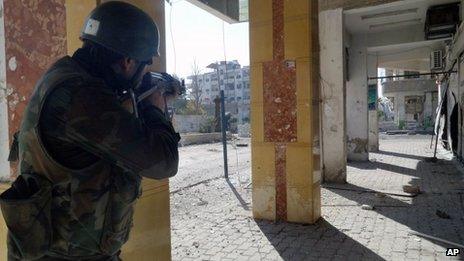Syria rebels aim to seize Damascus airport
- Published

Rebel fighters in Syria say that they are aiming to seize Damascus airport, saying it is a "fair target".
Rebel spokesmen say the airport is being used by the Syrian military and that it should be avoided by civilians.
There has been fierce fighting in recent weeks in the countryside around Damascus, known as the Ghouta.
The city's international airport has been inaccessible or closed to civilian flights repeatedly over the past two weeks.
As clashes continued there, a spokesman for the rebel Damascus Military Council, Nabil al-Amir, warned civilians that they approached it at "their own risk".
"The rebel brigades who have been putting the airport under siege decided yesterday that the airport is a fair target," he told the Reuters news agency. "The airport is now full of armoured vehicles and soldiers."
Army shelling
The Syrian army has reinforced positions outside two south-western suburbs of Damascus, activists have said, raising fears of a ground attack.
Throughout the day the Syrian army has been shelling the suburb of Darayya, the centre of which is controlled by armed rebels, the BBC's Middle East editor Jeremy Bowen reports from Damascus.
Rockets and shells have been fired at Darayya and the suburb of Muadhamiya, which are not far from Mezzeh military airport.
Rebels have sought to advance on central districts of the capital, while government forces have launched an operation to reclaim territory.
BBC's Jeremy Bowen: War feels much closer
As part of a flurry of diplomatic activity, UN Secretary General Ban Ki-moon has visited a refugee camp in southern Turkey and travelled to Ankara to meet Prime Minister Recep Tayyip Erdogan.
Mr Ban praised the humanitarian work being carried out to care for the estimated 200,000 Syrians who are being housed in Turkey.
He also said he was not aware of any confirmed reports that Syrian President Bashar al-Assad was preparing to use chemical weapons against the rebels, but warned that if he did so it would be "an outrageous crime in the name of humanity".
A US official said earlier this week that intelligence agencies had monitored activity that suggested "some potential chemical weapon preparation", which went beyond the movement of stockpiles.
Meanwhile, the Dutch government has said it has approved the sending of two Patriot missile batteries to Turkey.
Earlier this week the Nato alliance, of which Turkey and the Netherlands are both members, approved the deployment of the batteries after a request from the Turkish government.
Dutch Foreign Minister Frans Timmermans said a maximum of 360 Dutch troops would be sent to operate the missiles in a year-long deployment on the Turkish-Syrian border.
Explosions
The Syrian Observatory for Human Rights said the troops were covering their attempt to advance on outlying areas of Damascus with rocket and mortar-fire.
Residents believed the bombardment would be followed by a ground assault on rebel positions, the UK-based activist group added.
The army is reported to have launched a counter-offensive to reclaim territory within 8km (5 miles) of the capital, which it still controls.
The Local Co-ordination Committees (LCC), an opposition activist network, reported that 80 people had been killed across Syria on Friday, 22 of them in Damascus and its suburbs.
As many as 50 bodies were found in al-Jubaila, a district of the eastern city of Deir al-Zour, the group added. Local activists said they had been kidnapped two months ago by government forces and executed.
Activists say more than 40,000 people have been killed since the uprising against President Assad began in March 2011.